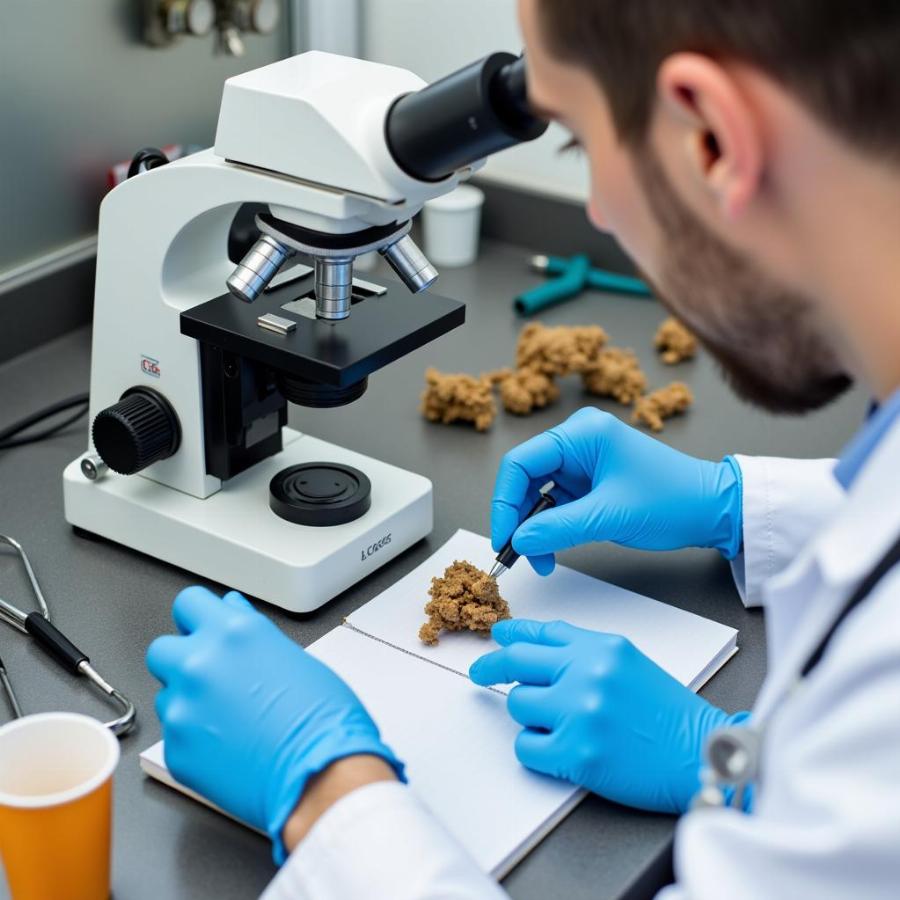Finding mucus in your dog’s stool can be alarming, but it’s not always a reason to panic. Mucus in dog poop can indicate a range of issues, from minor dietary indiscretions to more serious underlying health conditions. This article will guide you through the potential causes of mucus in dog stool, when to seek veterinary attention, and how to help keep your furry friend healthy.
Understanding Mucus in Dog Poop
First, it’s important to understand that a small amount of mucus in your dog’s feces is normal. Mucus plays a crucial role in the digestive process, acting as a lubricant and protecting the intestinal lining. However, excessive or unusual mucus is often a sign that something is amiss.
Here’s what to look for:
- Color: Mucus can appear clear, white, yellow, or even slightly bloody.
- Consistency: It might be stringy, jelly-like, or coat the stool’s surface.
Common Causes of Mucus in Dog Stool
Several factors can lead to an increase in mucus production in your dog’s digestive system. Here are some of the most common culprits:
Dietary Indiscretion
Just like us, dogs can experience digestive upset from eating something they shouldn’t. Scavenging from the trash, indulging in table scraps, or even a sudden change in diet can all disrupt their gut bacteria and lead to mucus in their stool.
“Dogs exploring the world through their noses often find themselves snacking on things they shouldn’t,” says Dr. Emily Parker, DVM. “This can range from spoiled food to grass, leading to temporary digestive upset and increased mucus production.”
Intestinal Parasites
Worms like roundworms, hookworms, whipworms, and Giardia can irritate the intestinal lining, causing inflammation and increased mucus production. If your dog has parasites, you might notice other symptoms like vomiting, weight loss, or a pot-bellied appearance.
Stress or Anxiety
Just as stress can affect our digestion, it can impact our canine companions too. Moving, changes in routine, or even loud noises can lead to stress colitis in dogs, resulting in mucus-coated stools.
Food Allergies or Intolerances
If your dog is sensitive to certain ingredients in their food, it can trigger inflammation in their gut. This often manifests as diarrhea, vomiting, and you guessed it, mucus in their stool. Common culprits include beef, chicken, dairy, and wheat.
Inflammatory Bowel Disease (IBD)
IBD is a chronic condition that causes ongoing inflammation in the digestive tract. While the exact cause is unknown, it’s believed to be linked to an overactive immune response to food or bacteria in the gut. Mucus in the stool is a common symptom of IBD, along with chronic vomiting, diarrhea, and weight loss.
When to Worry: Seeking Veterinary Care
While occasional bouts of mucus in your dog’s stool might not be cause for immediate concern, there are situations where you should seek veterinary attention promptly:
- Blood in the stool: If you see bright red blood or a black, tarry appearance, it could indicate a more serious condition.
- Lethargy or Weakness: If your dog is unusually tired or lacking energy, it could signal a systemic issue.
- Loss of Appetite: Refusal to eat or a significant decrease in appetite can be a red flag.
- Vomiting: Frequent or severe vomiting alongside mucus in the stool requires immediate attention.
- Abdominal Pain: If your dog seems uncomfortable or cries out when you touch their belly, seek veterinary care.
Diagnosing the Cause of Mucus in Dog Stool
Your veterinarian will likely ask you several questions about your dog’s history, including:
- Diet: What your dog eats, how often, and any recent changes
- Stool History: Frequency, consistency, and any other abnormalities
- Lifestyle: Exercise routine, living environment, and potential stressors
- Medical History: Past illnesses, medications, and vaccination status
To get a clearer picture of your dog’s digestive health, your vet may recommend:
- Fecal Exam: Analyzing a stool sample for parasites and other abnormalities
- Blood Work: Checking for signs of infection, inflammation, or organ dysfunction
- Abdominal X-rays or Ultrasound: Visualizing the digestive tract for blockages, tumors, or other structural issues
- Endoscopy: Using a small camera to examine the lining of the digestive tract and collect biopsies if needed.
 Veterinarian analyzing a dog stool sample
Veterinarian analyzing a dog stool sample
Treatment and Prevention
The treatment for mucus in dog stool depends entirely on the underlying cause. It might involve:
- Dietary Changes: Switching to a bland diet, eliminating potential allergens, or trying a prescription food for sensitive stomachs.
- Deworming Medication: Eliminating intestinal parasites with oral or topical medication.
- Antibiotics: Treating bacterial infections that may be contributing to inflammation.
- Anti-inflammatory Medications: Reducing inflammation in the gut and relieving discomfort.
Prevention is Key:
- Regular Veterinary Checkups: Early detection of potential problems is crucial.
- Proper Parasite Prevention: Administering monthly heartworm medication that also protects against common intestinal parasites.
- Safe Feeding Practices: Avoid feeding table scraps, discourage scavenging, and make dietary changes gradually.
- Stress Reduction: Providing a safe and comfortable environment for your dog and managing stress through exercise, play, and training.
Beaut Dogs: Your Partner in Canine Care
Beaut Dogs is your one-stop resource for all things dog-related. We provide reliable and in-depth information on the fascinating world of dogs, from breed characteristics and care guides to health tips and product recommendations.
If you have any concerns about your dog’s health or need further assistance, please don’t hesitate to contact us at [email protected] for detailed and accurate guidance. We’re here to help you keep your furry friend happy and healthy!
Do you have any other questions about mucus in dog stool or other canine health concerns? Explore more helpful articles on our website to learn more about providing the best care for your beloved companion.